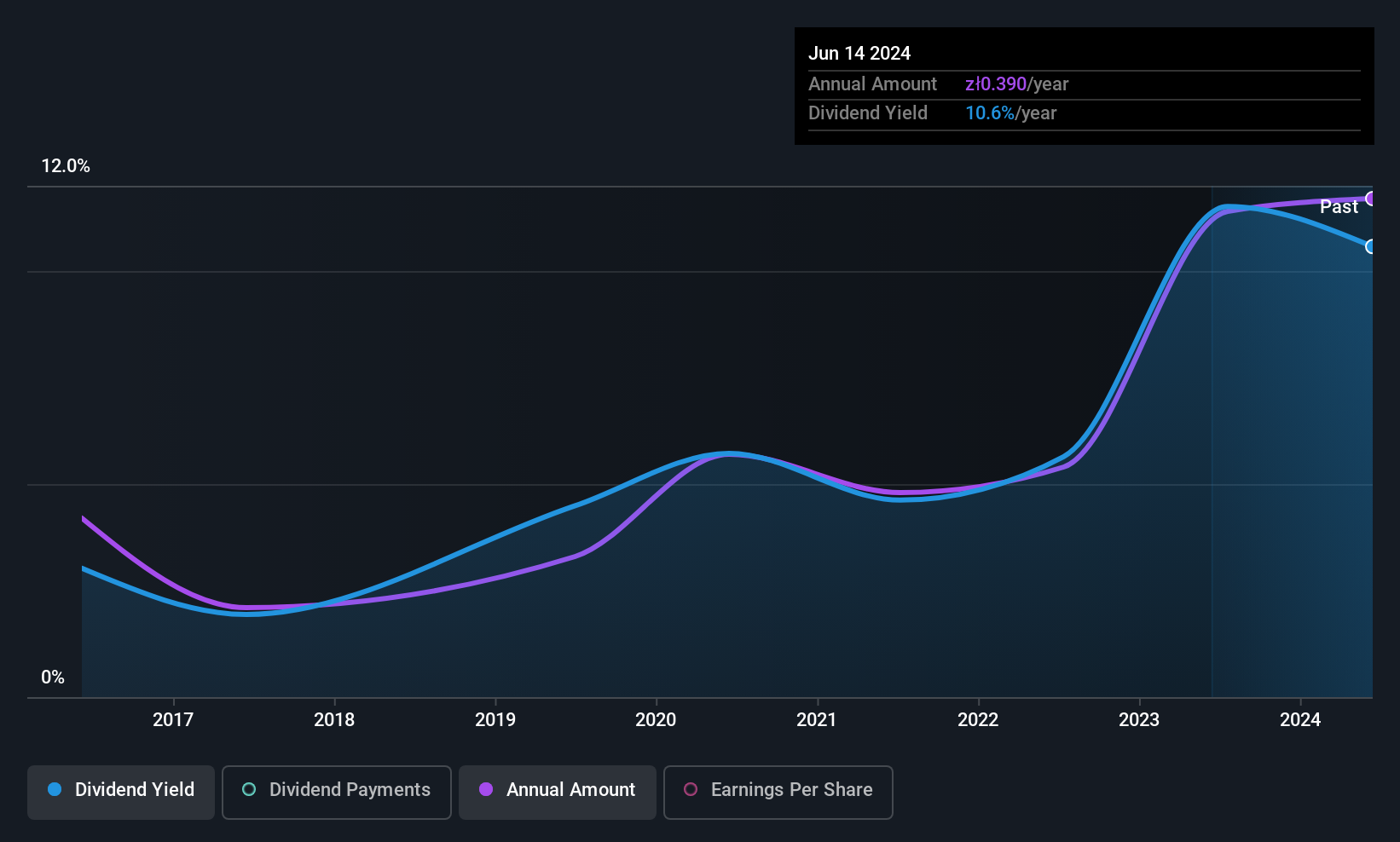- Poland
- /
- Consumer Finance
- /
- WSE:INS
Don't Race Out To Buy Indos SA (WSE:INS) Just Because It's Going Ex-Dividend

Readers hoping to buy Indos SA (WSE:INS) for its dividend will need to make their move shortly, as the stock is about to trade ex-dividend. Typically, the ex-dividend date is two business days before the record date, which is the date on which a company determines the shareholders eligible to receive a dividend. It is important to be aware of the ex-dividend date because any trade on the stock needs to have been settled on or before the record date. Accordingly, Indos investors that purchase the stock on or after the 4th of July will not receive the dividend, which will be paid on the 11th of July.
The company's upcoming dividend is zł0.27 a share, following on from the last 12 months, when the company distributed a total of zł0.27 per share to shareholders. Based on the last year's worth of payments, Indos has a trailing yield of 7.1% on the current stock price of zł3.80. Dividends are a major contributor to investment returns for long term holders, but only if the dividend continues to be paid. So we need to check whether the dividend payments are covered, and if earnings are growing.
If a company pays out more in dividends than it earned, then the dividend might become unsustainable - hardly an ideal situation. Indos paid out more than half (56%) of its earnings last year, which is a regular payout ratio for most companies. Indos paid a dividend despite reporting negative free cash flow over the last twelve months. This may be due to heavy investment in the business, but this is still suboptimal from a dividend sustainability perspective.
When a company paid out less in dividends than it earned in profit, this generally suggests its dividend is affordable. The lower the % of its profit that it pays out, the greater the margin of safety for the dividend if the business enters a downturn.
Check out our latest analysis for Indos
Click here to see how much of its profit Indos paid out over the last 12 months.

Have Earnings And Dividends Been Growing?
When earnings decline, dividend companies become much harder to analyse and own safely. If earnings fall far enough, the company could be forced to cut its dividend. That's why it's not ideal to see Indos's earnings per share have been shrinking at 3.7% a year over the previous five years.
The main way most investors will assess a company's dividend prospects is by checking the historical rate of dividend growth. Indos has delivered 7.6% dividend growth per year on average over the past nine years. Growing the dividend payout ratio while earnings are declining can deliver nice returns for a while, but it's always worth checking for when the company can't increase the payout ratio any more - because then the music stops.
The Bottom Line
Should investors buy Indos for the upcoming dividend? We're not overly enthused to see Indos's earnings in retreat at the same time as the company is paying out more than half of its earnings as dividends to shareholders. Indos doesn't appear to have a lot going for it, and we're not inclined to take a risk on owning it for the dividend.
With that being said, if you're still considering Indos as an investment, you'll find it beneficial to know what risks this stock is facing. To that end, you should learn about the 3 warning signs we've spotted with Indos (including 2 which shouldn't be ignored).
A common investing mistake is buying the first interesting stock you see. Here you can find a full list of high-yield dividend stocks.
New: AI Stock Screener & Alerts
Our new AI Stock Screener scans the market every day to uncover opportunities.
• Dividend Powerhouses (3%+ Yield)
• Undervalued Small Caps with Insider Buying
• High growth Tech and AI Companies
Or build your own from over 50 metrics.
Have feedback on this article? Concerned about the content? Get in touch with us directly. Alternatively, email editorial-team (at) simplywallst.com.
This article by Simply Wall St is general in nature. We provide commentary based on historical data and analyst forecasts only using an unbiased methodology and our articles are not intended to be financial advice. It does not constitute a recommendation to buy or sell any stock, and does not take account of your objectives, or your financial situation. We aim to bring you long-term focused analysis driven by fundamental data. Note that our analysis may not factor in the latest price-sensitive company announcements or qualitative material. Simply Wall St has no position in any stocks mentioned.
About WSE:INS
Indos
Operates as a financing and receivables management company in Poland.
Good value with mediocre balance sheet.
Market Insights
Community Narratives



